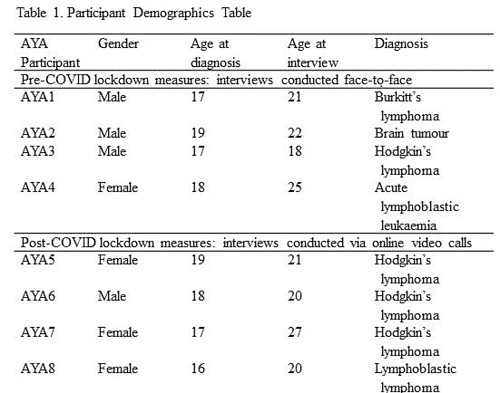
Contributions
Abstract: PB1744
Type: Publication Only
Session title: Quality of life, palliative care, ethics and health economics
Background
Adolescent and Young Adults (AYAs) establish their independent, adult identities as part of their psychosocial development, a process largely informed by educational experiences. Not only is a cancer diagnosis disruptive to this process but AYA cancer survivors (AYACs) face barriers as they attempt to reintegrate into educational systems. .
Aims
This study explores the experiences of AYACs as they return to education. We do this to better understand the challenges they face, identify resources already available to this patient population and make recommendations that facilitate return of AYACs to education.
Methods
In-depth semi-structured interviews were conducted with AYA cancer survivors (n=8), aged 16-19 at time of diagnosis and 18-27 at time of interview. Interviews were transcribed verbatim and analysed using the principles of Giorgi’s phenomenological analysis.
Results
Most participants were survivors of haematological malignancies (n=7, image 1). Four major themes were identified: AYAC survivors suffer from debilitating late effects (theme 1) post-treatment as they adjust to a loss of normality and other fundamental losses (theme 2) associated with a cancer diagnosis, such as irrecoverable future plans. The educational systems (theme 3) to which they return can be both accommodating, capable of making allowances, and uncompromising, unable to adapt to AYAC survivors’ needs. Support (theme 4) is vital for successful return to education.

Conclusion
This study supports previous findings that late effects and systemic barriers can hinder return to education but further research focused on this age group is required. We believe that treating clinicians and specialist services can facilitate the return of AYAs to education by providing warning and comprehensive information about late effects, as early as possible prior to treatment completion, as well as effective information-sharing with educational institutions.
Keyword(s): Survival
Abstract: PB1744
Type: Publication Only
Session title: Quality of life, palliative care, ethics and health economics
Background
Adolescent and Young Adults (AYAs) establish their independent, adult identities as part of their psychosocial development, a process largely informed by educational experiences. Not only is a cancer diagnosis disruptive to this process but AYA cancer survivors (AYACs) face barriers as they attempt to reintegrate into educational systems. .
Aims
This study explores the experiences of AYACs as they return to education. We do this to better understand the challenges they face, identify resources already available to this patient population and make recommendations that facilitate return of AYACs to education.
Methods
In-depth semi-structured interviews were conducted with AYA cancer survivors (n=8), aged 16-19 at time of diagnosis and 18-27 at time of interview. Interviews were transcribed verbatim and analysed using the principles of Giorgi’s phenomenological analysis.
Results
Most participants were survivors of haematological malignancies (n=7, image 1). Four major themes were identified: AYAC survivors suffer from debilitating late effects (theme 1) post-treatment as they adjust to a loss of normality and other fundamental losses (theme 2) associated with a cancer diagnosis, such as irrecoverable future plans. The educational systems (theme 3) to which they return can be both accommodating, capable of making allowances, and uncompromising, unable to adapt to AYAC survivors’ needs. Support (theme 4) is vital for successful return to education.

Conclusion
This study supports previous findings that late effects and systemic barriers can hinder return to education but further research focused on this age group is required. We believe that treating clinicians and specialist services can facilitate the return of AYAs to education by providing warning and comprehensive information about late effects, as early as possible prior to treatment completion, as well as effective information-sharing with educational institutions.
Keyword(s): Survival


